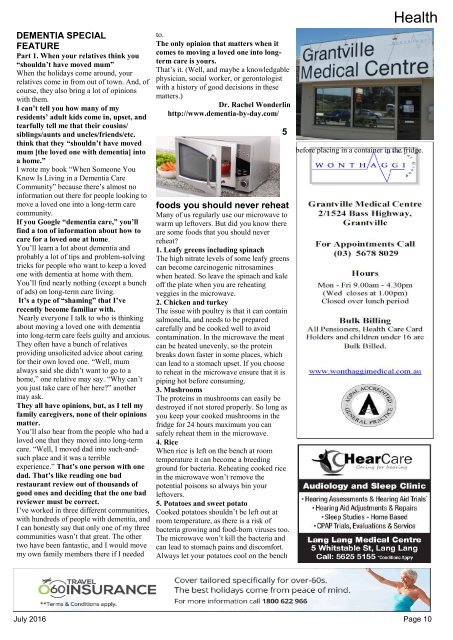Waterline News JULY web
Create successful ePaper yourself
Turn your PDF publications into a flip-book with our unique Google optimized e-Paper software.
DEMENTIA SPECIAL<br />
FEATURE<br />
Part 1. When your relatives think you<br />
“shouldn’t have moved mum”<br />
When the holidays come around, your<br />
relatives come in from out of town. And, of<br />
course, they also bring a lot of opinions<br />
with them.<br />
I can’t tell you how many of my<br />
residents’ adult kids come in, upset, and<br />
tearfully tell me that their cousins/<br />
siblings/aunts and uncles/friends/etc.<br />
think that they “shouldn’t have moved<br />
mum [the loved one with dementia] into<br />
a home.”<br />
I wrote my book “When Someone You<br />
Know Is Living in a Dementia Care<br />
Community” because there’s almost no<br />
information out there for people looking to<br />
move a loved one into a long-term care<br />
community.<br />
If you Google “dementia care,” you’ll<br />
find a ton of information about how to<br />
care for a loved one at home.<br />
You’ll learn a lot about dementia and<br />
probably a lot of tips and problem-solving<br />
tricks for people who want to keep a loved<br />
one with dementia at home with them.<br />
You’ll find nearly nothing (except a bunch<br />
of ads) on long-term care living.<br />
It’s a type of “shaming” that I’ve<br />
recently become familiar with.<br />
Nearly everyone I talk to who is thinking<br />
about moving a loved one with dementia<br />
into long-term care feels guilty and anxious.<br />
They often have a bunch of relatives<br />
providing unsolicited advice about caring<br />
for their own loved one. “Well, mum<br />
always said she didn’t want to go to a<br />
home,” one relative may say. “Why can’t<br />
you just take care of her here?” another<br />
may ask.<br />
They all have opinions, but, as I tell my<br />
family caregivers, none of their opinions<br />
matter.<br />
You’ll also hear from the people who had a<br />
loved one that they moved into long-term<br />
care. “Well, I moved dad into such-andsuch<br />
place and it was a terrible<br />
experience.” That’s one person with one<br />
dad. That’s like reading one bad<br />
restaurant review out of thousands of<br />
good ones and deciding that the one bad<br />
reviewer must be correct.<br />
I’ve worked in three different communities,<br />
with hundreds of people with dementia, and<br />
I can honestly say that only one of my three<br />
communities wasn’t that great. The other<br />
two have been fantastic, and I would move<br />
my own family members there if I needed<br />
to.<br />
The only opinion that matters when it<br />
comes to moving a loved one into longterm<br />
care is yours.<br />
That’s it. (Well, and maybe a knowledgable<br />
physician, social worker, or gerontologist<br />
with a history of good decisions in these<br />
matters.)<br />
Dr. Rachel Wonderlin<br />
http://www.dementia-by-day.com/<br />
foods you should never reheat<br />
Many of us regularly use our microwave to<br />
warm up leftovers. But did you know there<br />
are some foods that you should never<br />
reheat?<br />
1. Leafy greens including spinach<br />
The high nitrate levels of some leafy greens<br />
can become carcinogenic nitrosamines<br />
when heated. So leave the spinach and kale<br />
off the plate when you are reheating<br />
veggies in the microwave.<br />
2. Chicken and turkey<br />
The issue with poultry is that it can contain<br />
salmonella, and needs to be prepared<br />
carefully and be cooked well to avoid<br />
contamination. In the microwave the meat<br />
can be heated unevenly, so the protein<br />
breaks down faster in some places, which<br />
can lead to a stomach upset. If you choose<br />
to reheat in the microwave ensure that it is<br />
piping hot before consuming.<br />
3. Mushrooms<br />
The proteins in mushrooms can easily be<br />
destroyed if not stored properly. So long as<br />
you keep your cooked mushrooms in the<br />
fridge for 24 hours maximum you can<br />
safely reheat them in the microwave.<br />
4. Rice<br />
When rice is left on the bench at room<br />
temperature it can become a breeding<br />
ground for bacteria. Reheating cooked rice<br />
in the microwave won’t remove the<br />
potential poisons so always bin your<br />
leftovers.<br />
5. Potatoes and sweet potato<br />
Cooked potatoes shouldn’t be left out at<br />
room temperature, as there is a risk of<br />
bacteria growing and food-born viruses too.<br />
The microwave won’t kill the bacteria and<br />
can lead to stomach pains and discomfort.<br />
Always let your potatoes cool on the bench<br />
5<br />
Health<br />
before placing in a container in the fridge.<br />
July 2016 Page 10



